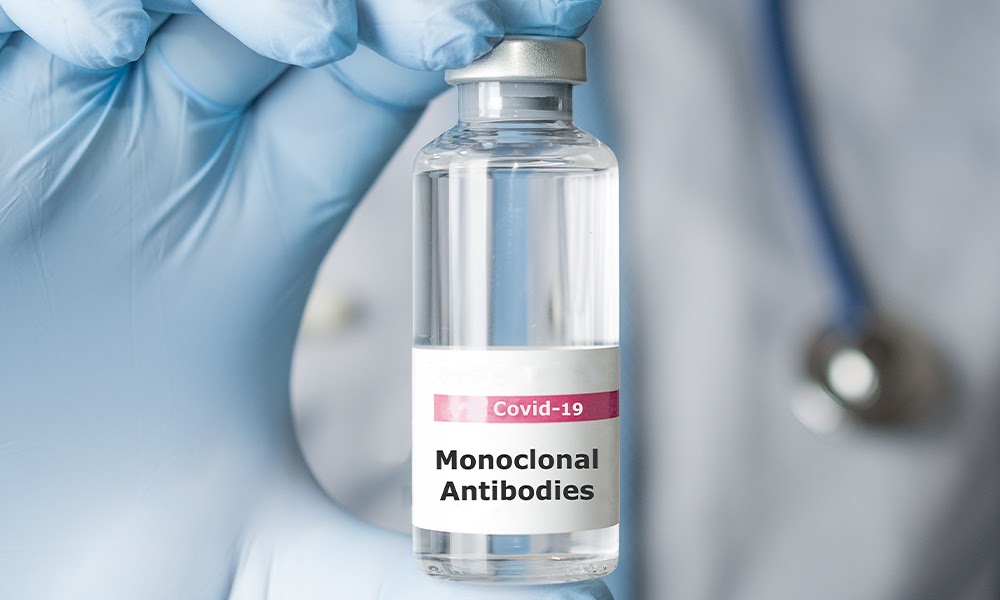Use of monoclonal antibodies in fight against COVID

Monoclonal antibodies are a type of therapeutic agent under research for the treatment of COVID-19. These agents are often created by classifying pathogen-specific B cells of patients who have recently recovered from the virus or by immunizing genetically mutated mice to have a humanized immune system and accumulating effective antibodies from them. Once the B cells are classified, the genes of immune globulin heavy and light chains are restored; these genes are further advanced to produce monoclonal antibodies.
Monoclonal antibodies have sole activity against a specific target; they vary from convalescent plasma cells, consisting of polyclonal antibodies in serum acquired from patients convalescing from an infection. Monoclonal antibodies have been developed to serve and block other viral diseases, such as HIV, influenza, RSV, MERS-CoV, Ebola, and Zika virus. Only monoclonal antibodies targeting RSV and Ebola are effective in human trials, with the former having FDA approval. Several products targeting the other viruses, as mentioned earlier, are currently being examined in clinical trials.
The virus enters host cells, obstructing viral attachment and admission into human cells. The preponderance of direct antiviral monoclonal antibody products is under advancement for SARS-CoV-2 as it targets the spike proteins. It is a recombinant neutralizing monoclonal antibody directed against the SARS-CoV-2 target proteins.
Monoclonal antibodies for COVID-19
Multiple epitopes of elemental antigenic on SARS-CoV and SARS-CoV-2 is the S protein, which expedites target cell binding and fusion in engaging the cell-surface angiotensin-converting enzyme 2 (ACE2) receptor, which is seen on cells in the respiratory system, endothelium, and gastrointestinal tract. Thus, types of antibodies that lead to the S protein can counterbalance the ability of the virus to bind and fuse, including the target host cell.
Humanized murine technology or restored plasma cells from healed patients have been used to procure neutralizing mAbs targeted to the RBD of the S protein. To date, most unconventional research efforts for the remedial use of neutralizing mAbs are converging on a handful of outcomes in clinical development, some of which are authorized as an emergency only.
Normal plasma cells make antibodies to boost the body to fight infection and illness. As the amount of multiple myeloma cells increases, more antibodies are produced.
MONOCLONAL ANTIBODIES IN TREATMENT FOR COVID-19
For the past three decades, monoclonal antibodies have changed how we treat various diseases – they have proved to be more productive, better endured, and more accessible to deliver than other sorts of treatments.
Researchers are confident that monoclonal antibodies could assist in preventing and treating early infections of Covid-19.
Some of the advantages of monoclonal antibodies are:
- They can precisely target the SARS-CoV-2 virus because they originate in the blood of individuals who have recovered from Covid-19, which would probably make it more efficient than other remedies.
- Ever since the pandemic started, more than 80 monoclonal antibody mimic products for Covid-19 are now in development- they can rapidly isolate and manufacture.
- They can provide active protection against the virus – once administered, monoclonal antibodies penetrate the bloodstream right away and offer instant protection for a few weeks or even months. Vaccines usually take a few weeks to work but habitually provide long-term protection. This is why researchers are hopeful that monoclonal antibodies could complement vaccines in helping to contain the ongoing pandemic.
- They have the potential to operate on infected patients or prevent viruses in most individuals, including the old and young children and immune-compromised individuals as well – some of whom cannot obtain a vaccine or individuals on whom vaccines do not always work.
Monoclonal Antibodies for SARS-CoV-2 Variants
Supplementary variants of the SARS-CoV-2 virus have recently been identified. These variants arise because of mutations in the genome of the infection. Monoclonal antibodies persist in being effective against the latest SARS-CoV-2 variant, also called B.1.1.7, first sequenced in the United Kingdom.
Nevertheless, some mutations may induce changes in the spike protein that could impede the effectiveness of the available monoclonal antibodies.
Monoclonal antibody therapies in severe COVID-19
Concurrent studies are investigating neutralizing mAbs for patients hospitalized with severe COVID-19. The REGN-COV2 trial in hospitalized cases registers patients with or without supplemental oxygen and is continuous. In line with various studies investigating CPT or neutralizing mAbs for patients with severe viral disease, including COVID-19, the data indicate that rapid viral clearance, in itself, is inadequate.
Instead, additional factors, such as an excessive immune response, are the primary drivers for persistent disease in this patient population. Thus, an early disease seen in outpatients is likely virally driven. In contrast, the pathophysiology for advanced inpatient disease is predominantly a post-viral or proviral phenomenon, with clinical status uncoupled from the viral load.
Potential Risks of Monoclonal Antibodies
Some patients could encounter either an allergic or a nonallergic infusion-related effect. Both effects are due to activation of the immune system in acknowledging the antibody but transpires in different ways. Infusion-related cross-reactivity seems unusual but can provoke itching, flushing, the brevity of breath, or even low blood pressure. There are also latent side effects of experiencing any IV medication, including pain, soreness, or wounding around the IV site.
Contact Helvetica Health Care for more information on monoclonal antibodies.
